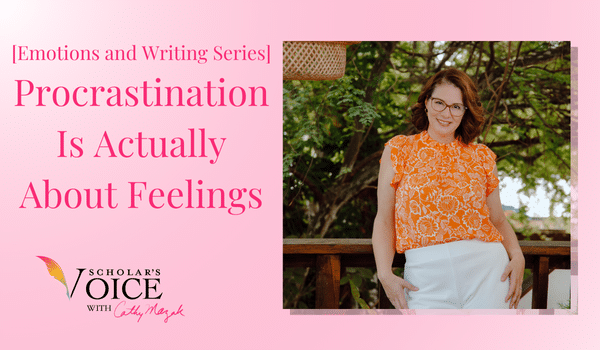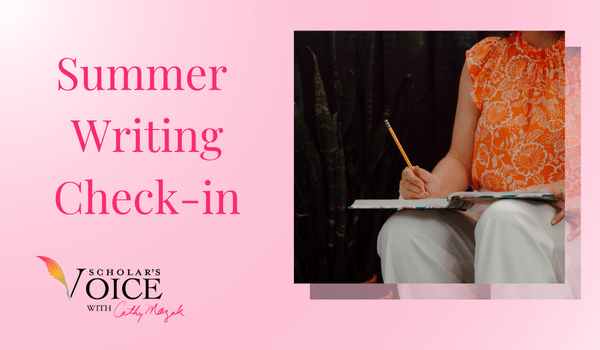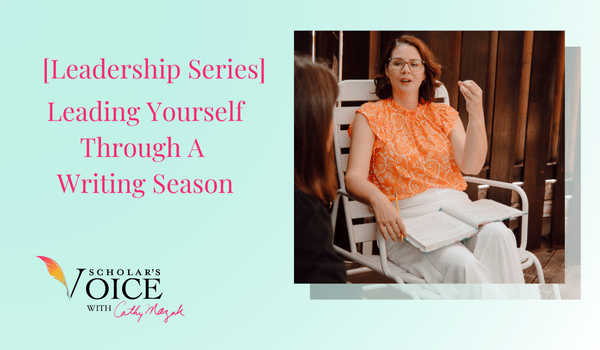[Emotions And Writing Series] Procrastination Is Actually About Feelings

Welcome to the second episode of the ‘Emotions and Writing’ podcast series. Today, we are tackling procrastination.
MORE DETAILS
Procrastination is usually associated with negative self-talk, like laziness or ineptitude. But the real reason behind it is emotional. I start the episode by discussing how academics think about procrastination and why that mindset backfires. Then, I share a framework to help you get out of the cycle of procrastination around a writing project.
There is a very close connection between procrastination and emotions. Procrastination isn’t about productivity; it’s about feelings. If you struggle with procrastination and want to get to the heart of the problem, this episode is for you. Tune in and learn how to break through procrastination and get your writing project back on track!
Why Do You Procrastinate?
Here are some examples of the messages academics tell themselves about procrastination.
- I’m waiting to write because I need a big block of time and can’t schedule that right now.
- The writing project is almost finished, so it’s okay to put it off now.
- Negative self-talk, such as ‘I’m lazy, I’m disorganized, I’m not smart enough or qualified enough.’
Procrastination has a negative connotation, and we give it these labels without understanding the real reason behind it. When we don’t address the emotional cause of procrastination, we get into a cycle where we procrastinate more and more, and more, and the project never gets done because the idea of finishing is too overwhelming or unattainable.
I recommend reading the book, Laziness Does Not Exist by Devon Price.
Framework to Get Out of the Cycle of Procrastination
If you are struggling with procrastination, ask yourself, ‘What am I avoiding feeling when I put off writing?’ Then, follow this framework to break the procrastination cycle.
Step 1: Name the feeling you are avoiding by procrastinating.
Example: You don’t know the answer to the problem you are writing about.
Step 2: Put a positive feeling on the emotion you are avoiding.
Example: If you are avoiding the feeling of ineptitude or fear of not knowing the answer to the problem you are trying to solve, try saying, ‘Not knowing is part of scholarship.’
Step 3: Make a plan to work through the feeling you are trying to avoid and break the procrastination cycle.
Example: What resources will help you find the answer? Can you do more research, consult a colleague, or bring in a co-author?
“The word procrastination is a very negative word. That’s why I don’t like to use it. When I hear my client talking about procrastinating, I try to shut it down because they are labeling instead of finding the reason that it is happening. When you label not working on a writing project as procrastination you aren’t answering the more important question which is what is going on that makes me put off writing.”
“The true cause of procrastination in your writing is not going to be solved by a productivity book. It is not even going to be solved by a writing book necessarily. Using a new tool or using a bullet journey is not going to help you solve the problem of procrastination because it is an emotion-based problem.”
We’ve opened the waitlist for our next cohort of Navigate: Your Writing Roadmap®. Check out the program details and get on the waitlist here.
CONTINUE THE CONVERSATION:
- Our 12-week Navigate: Your Writing Roadmap® program helps tenure-track womxn and nonbinary professors to publish their backlog of papers so that their voice can have the impact they know is possible. Get on the waitlist here!
- Cathy’s book, Making Time to Write: How to Resist the Patriarchy and Take Control of Your Academic Career Through Writing is available in print! Learn how to build your career around your writing practice while shattering the myths of writing every day, accountability, and motivation, doing mindset work that’s going to reshape your writing,and changing academic culture one womxn and nonbinary professor at a time. Get your print copy today or order it for a friend here!
- Want to train with us for free on your campus? Now you can when you recommend our Scholar’s Voice™ Faculty Retreats to a decision-maker on your campus! Download the brochure with the retreat curriculum and both in-person and online retreat options here.
- If you would like to hear more from Cathy for free, please subscribe to the weekly newsletter, In the Pipeline, at scholarsvoice.org. It’s a newsletter that she personally writes that goes out once a week with writing and publication tips, strategies, inspiration, book reviews and more.
CONNECT WITH ME:
RELATED PODCASTS
Stay current in Academic Publishing
Subscribe to our newsletter:
In the Pipeline
writing tips, publishing trends, reading recomendations, free workshops





